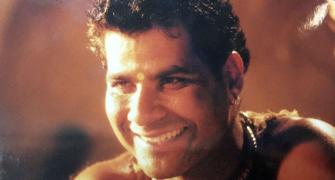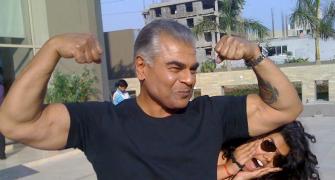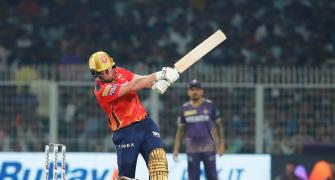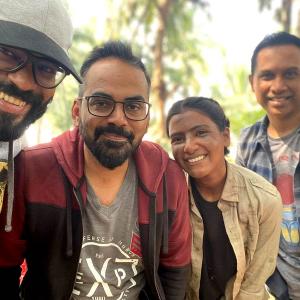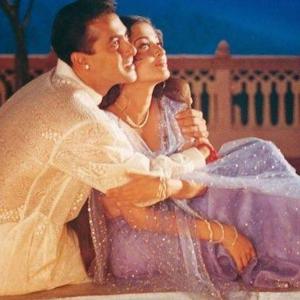'Skater Girl is India's first film on skateboarding and I hope that it inspires girls and boys across the world and brings them hope.'

Rarely does a film give back to society.
Skater Girl -- directed by young film-maker Manjari Makijany -- is one such film that not only gave India its first and largest skatepark facility spanning 15,000 square feet in Rajasthan but also, it gave every girl hope, through the story of a teenage rural girl, who discovers skateboarding and goes on to make history.
Manjari, whose father is the late actor Macmohan, gives Rediff.com Contributor Sameena Razzaq an exclusive peek into her life, as a young film-maker who is breaking the glass ceiling through talent, grit, determination.
"That joy to be able to finally say, I'm a director and interact with your audience directly is inexplicable," she says.
Skater Girl sends out hope through the story of a teenage rural girl from Rajasthan, who discovers skateboarding. What led you to this unusual idea and what does the film mean to you personally?
Skater Girl is a story that hopefully inspires girls to dream and challenge conventions.
I stumbled upon the rising skateboarding movement in India a few years ago and did deep research.
We learned that no matter how old you are, where you skate, which strata of society you belong to, when you step on the board, you feel a sense of freedom and achievement.
As a nod to existing skate communities in India, we wove in little details like 'No School No Skateboarding,' which was initiated in India's first rural skatepark in Kovalam, then adopted by Janwaar in Madhya Pradesh.
The catalyst to introducing skateboards in the village was an inspiration drawn from Khempur itself where the local kids had makeshift skateboards called gaadis.
So while these little nuances made their way into the film, the film is so much more than just skating.
We interacted with skaters and brought on many skate consultants to understand the subculture of skateboarding and its impact, but it was our time interacting with the rural girls in Rajasthan that shaped the core of the film.
Most of them would be married off early, were bound by social barriers and the caste system and they hadn't given much thought to their dreams and aspirations.
We realised this is the story of many girls in rural India. So we decided to build a skatepark in Rajasthan to inspire and impact a new community through skateboarding.
Skater Girl is India's first film on skateboarding and I hope that it inspires girls and boys across the world and brings them hope.
I also wish it shines a light on all the amazing work different skate communities in India are doing. Many people still don't know skateboarding exists and is thriving in India.
Everyone seems to be curious about Skater Girl and there are expectations as you come from a reputed film family. Does all this overwhelm you considering the film marks your directorial debut?
I'm thrilled by how well the film has been received and appreciated by audiences the world over.
I guess they all relate to the universal themes in the film we set out to capture.
I worked with the story for a year, then nurtured the vision through prep, production and post for years. After that, I released the film and it goes from being mine to being yours.
Each film -- short or feature length -- has its own journey.
So while I do come from a film family (of actors), as a director, I never felt any such pressure except facing the challenges that film-makers face when putting together their first feature.
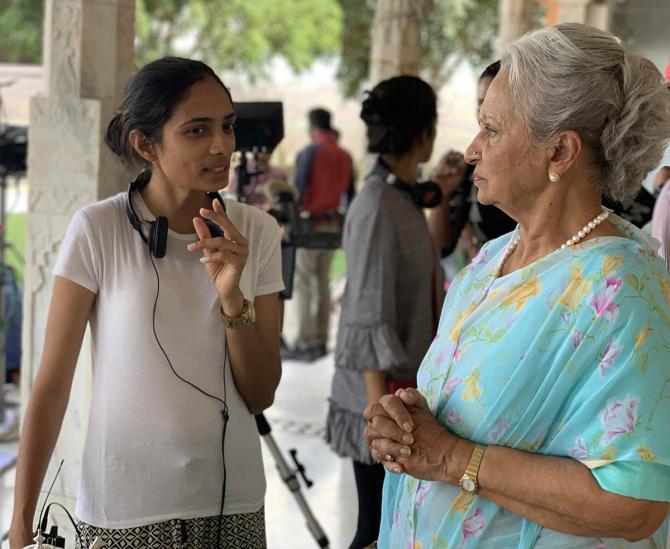
Waheeda Rehman had shot Guide in Udaipur in the 1960s and she never went there after that. In a coincidence of sorts, Skater Girl got Waheedaji back again to Udaipur to relive her Guide days.
Waheedaji visited Udaipur for the shoot of Skater Girl after almost 54 years of shooting Guide.
When she spoke about her Guide experience, one could see the nostalgia and the smile it brought to her face.
In one of our conversations, she very casually said how she would love to revisit the Taj Lake Palace where she stayed 54 years ago.
We managed to arrange that for her and it was a very memorable visit for her.
We met the king (the maharana of Mewar) -- Shri Arvind Singh Mewar -- and she told him about our film.
It was an honour to work with her on Skater Girl. She was gracious, humble and effortless. I couldn't have imagined anyone else playing the queen's role.
In 60 years of Waheedaji's career, this is the first time she is working with a female director. What would you attribute her faith and confidence in you to?
Many thought Waheedaji became a part of our film due to a prior connection. but that was not the case.
After months of trying to get in touch with her, when we finally managed to connect and narrated the concept of the film to her, I remember she took an emotional pause and said she would do it. It was the first time she said yes to a film so quickly.
We're glad she trusted our story, the vision and the honest intention of making this film.
Her saying yes to the film was a very validating experience.
I knew she was the perfect choice to play the queen. When I found out I was the first female director she worked with, I was honoured but also saddened at the lack of female film-makers during her time.
Hopefully, I'm the first, but not the last.
Times are changing and there are quite a few women directors out there now but still, it's not enough. We need more.
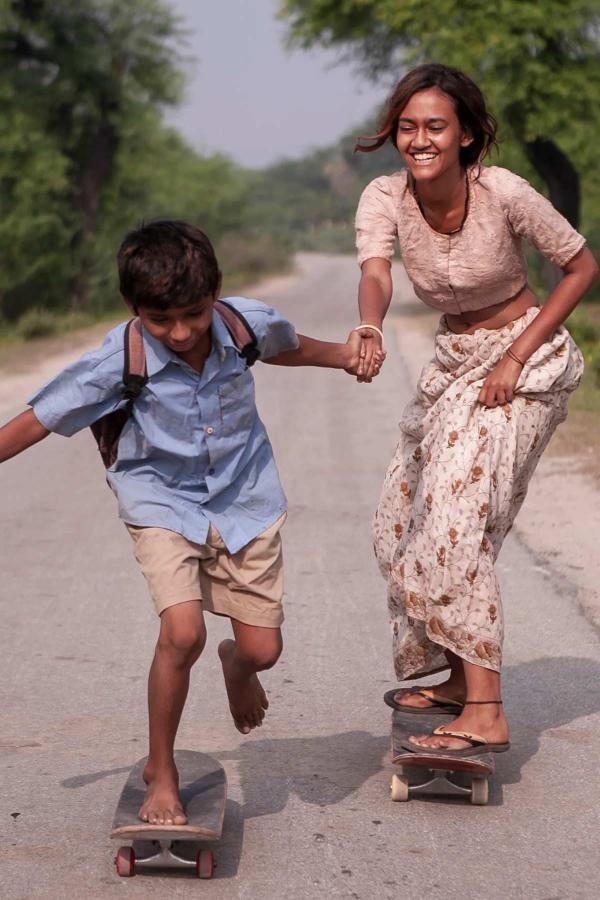
As part of the film, the producers built India's largest skate park spanning over 15,000 square feet. This park is a public skatepark facility for children and visiting skaters and also adds to the growing trend of skateboarding here.
No film has given back to the society in this novel way so far. As a director, how do you look at this achievement?
We decided to build the Desert Dolphin Skatepark in 2017. Making a skatepark was the most challenging but also the most satisfying part of Skater Girl.
It dawned on me that if we are making a film on skateboarding and the social impact it can have on a community, why shouldn't we consider building a new skatepark?
I remember when I told Emmanuel and Vinati, the producers, about this idea, they were silent for a moment. But we all agreed that it was the right thing to do for the community.
It was an ambitious decision as we were a small indie film but we took it as a challenge and a personal commitment.
100 Ramps, a skatepark construction company, along with Holystoked in Bangalore led our skatepark construction work and assembled a local and international build crew.
Jessica's character was naturally based on our struggles making Rajasthan's first skatepark.
As a film-maker, it's an incredible feeling to be able to impact social change in a community through film-making.
Today, when we see the children prepare and take part in the National championships, it brings us great joy.
You started with a silent film The Last Marble. Why is that?
The Last Marble was more of a test for myself to see if I could actually direct. Telling a story without words is tough but a good test to put yourself through.
That story didn't demand words, the emotion was universal and the kids were amazing at expressing without dialogue.
It worked and I passed my own test as that film did very well at festivals.
I feel short films are a great way to start your journey as a film-maker as they allow you to explore, experiment and help you find your voice.

Your second film The Corner Table was critically acclaimed and nominated for awards at film festivals. Do you think this film was instrumental in consolidating your position as a bankable director?
I got several rejections from film festivals too (laughs) but that's part of the game.
I was honoured to work with one of my dad's friends, the late Tom Alter in The Corner Table.
It was the first time I was directing a known actor. Just like in any other field, practice makes a person perfect and I wanted to keep honing my craft.
After that, I had the opportunity to do another short film, I See You, when I got selected for the prestigious AFI DWW programme.
We got to showcase our shorts at the Director's Guild of America and that's how I got my Hollywood agent. So the power of making short films and putting it out there is really worth it.
You have worked as an assistant director in films like Wake up Sid and Saat Khoon Maaf, Would you call that experience as learning from the best in the industry?
Yes, I was very fortunate to work with some of the best.
After graduating with a degree in mass media, I started as an assistant director and learned a lot about film-making on the job.
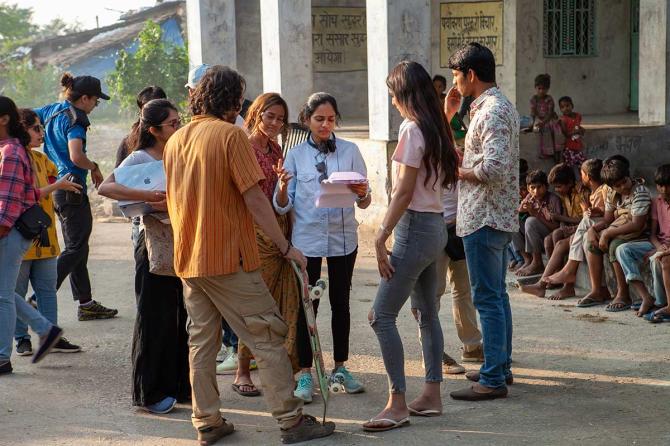
You had said you have an opinion on every film you watch. What do you think about the late Macmohan's films like Sholay and Kala Pathar?
We watched a lot of movies and plays as kids and that rubbed off on us early on.
We used to recognise him on TV when we were young but never sat through all his films as he would always get beaten up as the bad guy.
He would often get mobbed in public and people would mouth his famous dialogues wherever we went but I hadn't seen Sholay until much later in life.
While Sholay gave him fame, it's Kala Pathar that remains my favourite because he makes a big sacrifice for his friend in that film and that was a lot like him in real life.
That film always makes me cry.
What advice you would like to give young film-makers who want to follow your footsteps to Hollywood?
I can say what worked for me, but everyone's path is different.
I came up as an assistant director, made a short film, got rejected from a bunch, got selected for a few and then traveled to festivals with it.
That joy to be able to finally say, I'm a director and interact with your audience directly is inexplicable.
I had to be patient because rejections are inevitable.
Sometimes it's not even about what you are submitting/ pitching. It's just that it's not in line with what they're looking for that year.
Just hustling and getting something out there so people can see you and your work is something you have to proactively work upon whether it's labs, shorts, an indie feature or a prestigious programme or a workshop where the industry takes notice, we need that first film to get leverage and get our foot in the door.


